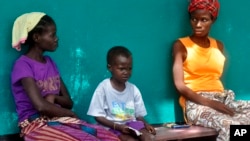Some measures to enforce quarantines and curb movement in Guinea, Liberia and Sierra Leone have come under fire for infringing on civil liberties.
In some instances, according to the international organization Human Rights Watch, total lockdowns have been arbitrarily applied and inadequately monitored, making them ineffective in aiding public health — and disproportionately impacting communities and livelihoods.
Fear deters treatment
Fear of contagion is preventing patients from accessing basic health care, said Juli Switala, a South African pediatrician with Doctors Without Borders' clinic in Bo, Sierra Leone.
Switala said a "collapsing health care system" and stretched resources have forced her team to make some tough choices in the face of Ebola — such as deciding not to treat some sick babies out of fear that they may infect staff. Her team also has limited some life-saving activity, such as handling emergency births with high levels of bleeding.
"It's very difficult to be the gynecologist who is making the decision to do a Caesarean section where there is going to be a lot of blood and a lot of body fluids, and you are putting your staff and team at risk if you do this," Switala said. "There are a lot of women dying ... because of this problem."
Progress slowed, reversed
Guinea, Sierra Leone and Liberia, three of the world’s poorest countries, have made some progress in securing aspects of human rights, including access to health, since emerging from decades of conflict and political turmoil.
But serious challenges remain. A legacy of unrest has led to endemic corruption, crushing poverty and extremely weak health systems that are now buckling under the pressure of the highly infectious hemorrhagic fever.
Ebola's burden on these countries is "extremely worrying," said Corrine Dufka, associate director of West Africa for Human Rights Watch.
“While all of these countries have made progress in addressing some of the issues that gave rise to this violence, they still have quite a long way to go," she said. "The potential economic collapse and the pressure being put on these countries could really reverse a number of these extremely hard-won gains in respect for human rights and democracy – and that would be an additional tragedy.”
Anti-African prejudice
Zeid Ra'ad al-Hussein, the United Nations' new human rights chief, has said he is concerned by anti-African prejudices arising from the crisis. He warned against what he described as ill-conceived quarantine enforcements and discriminatory travel restrictions.
"Only a response that is built on respect for human rights will be successful in quashing the epidemic," Zeid said. "We must also beware of 'us' and ‘them,’ a mentality that locks people into rigid identity groups and reduces all Africans – or all West Africans, or some smaller, national or local group – to a stereotype. … It is also vital that every person struck down with Ebola be treated with dignity, not stigmatized or cast out."
The United States announced its first Ebola-related travel restrictions this month, amid mounting political pressure to enforce outright bans on passengers originating from affected countries in West Africa.
Aid organizations have rallied against proposed travel bans, arguing that travelers may try to conceal their countries of origin or hide symptoms if they are feeling unwell.
Limiting air travel and shipping from the affected areas also could adversely impact trade, increasing the isolation and economic hardship of affected countries.
Some information for this report was contributed by the Associated Press.




